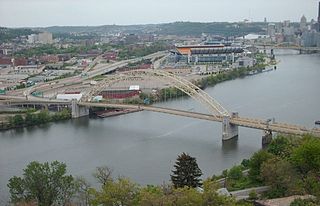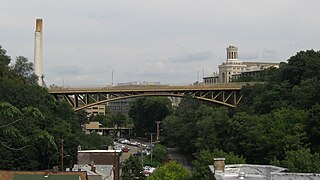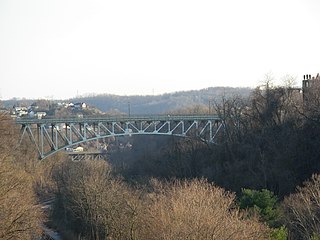
Squirrel Hill is a residential neighborhood in the East End of Pittsburgh, Pennsylvania, United States. The city officially divides it into two neighborhoods, Squirrel Hill North and Squirrel Hill South, but it is almost universally treated as a single neighborhood.

Greenfield is a neighborhood in the city of Pittsburgh, in the state of Pennsylvania in the United States. It is part of the city's 15th Ward along with Hazelwood and Glen Hazel. Greenfield is adjacent to the neighborhoods of Squirrel Hill to the north and east, Hazelwood to the south and west, and Oakland to the northwest. Greenfield includes the geographically and culturally distinct sub-neighborhood of Four Mile Run, also known as Rusyn Valley. Pittsburgh Fire Station #12 is located in the neighborhood on Winterburn Avenue.

The Bronx–Whitestone Bridge is a suspension bridge in New York City, carrying six lanes of Interstate 678 over the East River. The bridge connects Throggs Neck and Ferry Point Park in the Bronx, on the East River's northern shore, with the Whitestone neighborhood of Queens on the southern shore.

The Squirrel Hill Tunnel is a tunnel in Pittsburgh, Pennsylvania, United States. It serves as an eastern gateway to the city for I-376 and was completed in 1953 after 8 years of construction and at a cost of US$18 million. At the time of opening it was the single largest investment by the Pennsylvania Department of Transportation. It is 4,225 feet (1,288 m) long and is a twin-bore tunnel with 8 cross passages.

The South Tenth Street Bridge, most often called the Tenth Street Bridge, but officially dubbed the Philip Murray Bridge, is a suspension bridge that spans the Monongahela River in Downtown Pittsburgh, Pennsylvania.

The West End Bridge is a steel tied-arch bridge over the Ohio River in Pittsburgh, Pennsylvania, approximately 1 mile (1.6 km) below the confluence of the Allegheny and Monongahela Rivers. It connects the West End to the Chateau neighborhood on the North Side of Pittsburgh.

A large metropolitan area that is surrounded by rivers and hills, Pittsburgh has an infrastructure system that has been built out over the years to include roads, tunnels, bridges, railroads, inclines, bike paths, and stairways; however, the hills and rivers still form many barriers to transportation within the city.

The Boulevard of the Allies is a mostly four-lane road in the U.S. state of Pennsylvania, connecting Downtown Pittsburgh with the Oakland neighborhood of the city.

Pennsylvania Route 885 is a 14.1-mile-long (22.69 km) north–south state highway in the U.S. state of Pennsylvania. It runs from Pennsylvania Route 837 in Clairton north to Interstate 579 in Pittsburgh. The route is entirely within Allegheny County and serves as a connector between the city of Pittsburgh and its southern suburbs.

Schenley Plaza is a public park serving as the grand entrance into Schenley Park in Pittsburgh, Pennsylvania.

Schenley Tunnel is a railroad tunnel in Pittsburgh, Pennsylvania, United States. The tunnel runs beneath Neville Street in the city's North Oakland neighborhood; the south portal is at the upper end of Junction Hollow emerging from under Filmore St., the north emerges from under Centre Ave. into a ravine that opens into Skunk Hollow, between North Oakland and Bloomfield.

The Schenley Bridge is a steel three-hinged deck arch bridge spanning Junction Hollow in Pittsburgh, Pennsylvania. It carries Schenley Drive between Oakland on the west and the main part of Schenley Park on the east, connecting Schenley Plaza, the Carnegie Institute, and the Frick Fine Arts Building with Frew Street, Flagstaff Hill, and Phipps Conservatory. The bridge spans 620 feet (190 m) and arches 120 feet (37 m) above the hollow.

The Panther Hollow Bridge is an American steel, three-hinged, deck arch bridge that carries Panther Hollow Road over Panther Hollow in Schenley Park in Pittsburgh, Pennsylvania.

Forbes Avenue is one of the longest streets in Pittsburgh, Pennsylvania, United States. It runs along an east–west route for a length of approximately 7 mi (11 km).

The Bloomfield Bridge is a bridge in Pittsburgh, Pennsylvania, which carries four lanes of traffic across Skunk Hollow, a steep ravine between the densely populated neighborhoods of Bloomfield and Polish Hill.

Panther Hollow Lake is a human-made lake in Schenley Park in Pittsburgh, Pennsylvania.

The Fern Hollow Bridge is a bridge in the East End of Pittsburgh, Pennsylvania, United States, that carries Forbes Avenue over a large ravine in Frick Park. The current bridge is the third on the site. The first Fern Hollow Bridge opened in 1901 as a steel deck arch, and was demolished in 1972 while the second bridge was being built. The second bridge opened in 1973 and collapsed on January 28, 2022. Construction of the third bridge began on May 9, 2022, and the third bridge was dedicated on December 20, 2022.

The Charles Anderson Memorial Bridge is a steel deck truss bridge located in Pittsburgh, Pennsylvania, United States. The bridge carries the four-lane roadway of Boulevard of the Allies across a ravine known as Junction Hollow, connecting the neighborhoods of Central Oakland and South Oakland with Schenley Park. The bridge also spans the Junction Hollow Trail and P&W Subdivision railroad tracks which run along the bottom of the valley.

The E. H. Swindell Bridge is a steel deck truss cantilever bridge located in Pittsburgh, Pennsylvania, United States. The bridge connects the adjoining hilltop neighborhoods of Perry South, Spring Hill–City View, and Northview Heights on the city's North Side. It spans a ravine known as East Street Valley or Butcher's Run which was formerly a residential neighborhood but is now occupied by Interstate 279.























